Trump calls for $850bn coronavirus stimulus package
US citizens could be give $1,000 as part of ‘most dramatic stimulus effort since the Great Recession’
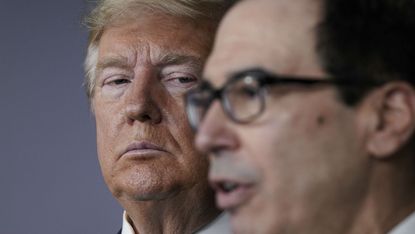
Donald Trump has called for an emergency $850bn (£702bn) economic stimulus package to deal with the devastating impact of the coronavirus pandemic.
Speaking at a press conference yesterday, the president said: “It’s going to be big, it’s going to be bold, and the level of enthusiasm to get something done, I don’t think I’ve seen anything quite like it.”
With talks between the White House and Congress expected to be fast-tracked, the package would constitute the “most dramatic stimulus effort seen since the Great Recession of 2009”, The Independent reports.
Subscribe to The Week
Escape your echo chamber. Get the facts behind the news, plus analysis from multiple perspectives.

Sign up for The Week's Free Newsletters
From our morning news briefing to a weekly Good News Newsletter, get the best of The Week delivered directly to your inbox.
From our morning news briefing to a weekly Good News Newsletter, get the best of The Week delivered directly to your inbox.
The Washington Post explains that the plan “would be mostly devoted to flooding the economy with cash”, either through a payroll tax cut or some other mechanism.
Some $50bn (£41bn) will also be directed specifically to helping the airline industry, the paper adds.
–––––––––––––––––––––––––––––––For a round-up of the most important business stories and tips for the week’s best shares - try The Week magazine. Start your trial subscription today –––––––––––––––––––––––––––––––
The $850bn package may come in addition to another $100bn-plus (£82.5bn) package that aims to provide paid sick leave, unemployment insurance and other benefits for workers impacted by the virus’ spread.
In what The Daily Telegraph labels a “sudden embrace of what has been a signature policy of left-wing politicians”, Trump also wants to hand Americans more than $1,000 (£825) in direct payments, as part of a further economic relief programme.
However, whether the massive cash injections will stave off economic catastrophe is not yet know. Reuters reports that “the coronavirus shockwaves rippling through US stocks are forcing investors to contemplate outcomes more dire than a recession”.
The news agency adds that these outcomes include several quarters of declining economic activity, a credit crisis or a depression.
“This market looks like it has already priced in most of a garden variety recession,” said Frances Donald, global chief economist at Manulife Investment Management. “It is now on top of that having to price in some probability of a credit crisis.”
Forecasters at Goldman Sachs and other banks are now projecting a steep economic contraction in at least the second quarter, as governments in the United States and Europe start shutting restaurants, closing schools and calling on citizens to stay home.
“But there is hope among some economists that economy will start expanding again later this year - depending in part on efforts to contain the virus” says Reuters.
Create an account with the same email registered to your subscription to unlock access.
Sign up for Today's Best Articles in your inbox
A free daily email with the biggest news stories of the day – and the best features from TheWeek.com
-
 'Criminal trail?'
'Criminal trail?'Today's Newspapers A roundup of the headlines from the US front pages
By The Week Staff Published
-
 Grindr 'shared user HIV status' with ad firms, lawsuit claims
Grindr 'shared user HIV status' with ad firms, lawsuit claimsSpeed Read LGBTQ dating app accused of breaching UK data protection laws in case filed at London's High Court
By Rebecca Messina, The Week UK Published
-
 The best dog-friendly hotels around the UK
The best dog-friendly hotels around the UKThe Week Recommends Take a break with your four-legged friend in accommodation that offers you both a warm welcome
By Adrienne Wyper, The Week UK Published
-
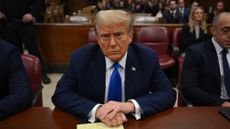 Sitting in judgment on Trump
Sitting in judgment on TrumpOpinion Who'd want to be on this jury?
By Susan Caskie Published
-
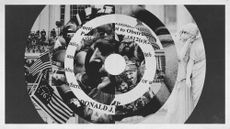 How could the Supreme Court's Fischer v. US case impact the other Jan 6. trials including Trump's?
How could the Supreme Court's Fischer v. US case impact the other Jan 6. trials including Trump's?Today's Big Question A former Pennsylvania cop might hold the key to a major upheaval in how the courts treat the Capitol riot — and its alleged instigator
By Rafi Schwartz, The Week US Published
-
 'A direct, protracted war with Israel is not something Iran is equipped to fight'
'A direct, protracted war with Israel is not something Iran is equipped to fight'Instant Opinion Opinion, comment and editorials of the day
By Harold Maass, The Week US Published
-
 'Good riddance to the televised presidential debate'
'Good riddance to the televised presidential debate'Instant Opinion Opinion, comment and editorials of the day
By Harold Maass, The Week US Published
-
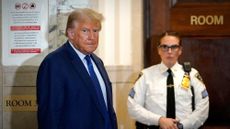 Trump's first criminal trial starts with jury picks
Trump's first criminal trial starts with jury picksSpeed Read The former president faces charges related to hush money payments made to adult film star Stormy Daniels
By Peter Weber, The Week US Published
-
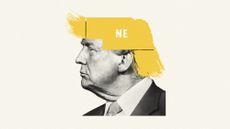 Why are Republicans trying to change Nebraska's Electoral College vote?
Why are Republicans trying to change Nebraska's Electoral College vote?Today's Big Question It's a chance for Donald Trump to block Joe Biden's path to re-election
By Joel Mathis, The Week US Published
-
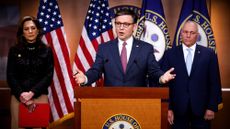 House GOP scuttles FISA vote at Trump's urging
House GOP scuttles FISA vote at Trump's urgingSpeed Read Right-wing lawmakers blocked Speaker Mike Johnson's surveillance bill
By Rafi Schwartz, The Week US Published
-
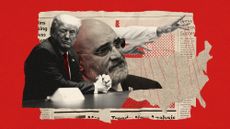 To win the election, Trump is changing how elections are run
To win the election, Trump is changing how elections are runUnder The Radar While the former president campaigns for a second term in office, he and his team have quietly been working to tilt the nation's electoral rules in his favor.
By Rafi Schwartz, The Week US Published